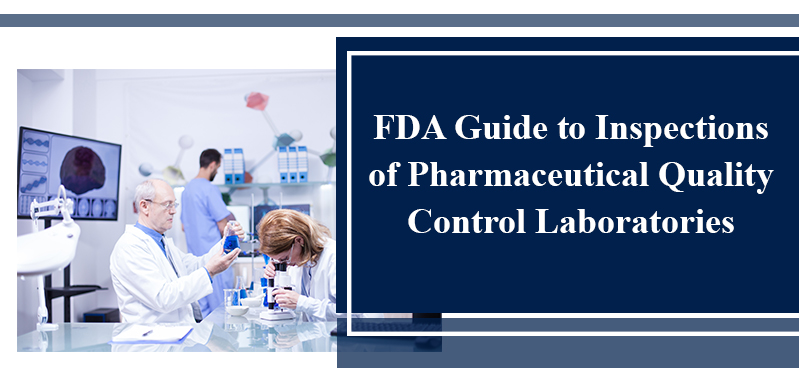
FDA Guide to Inspections of Pharmaceutical Quality Control Laboratories
Do you know the slightest misstep can lead to huge altering consequences in the pharmaceutical industry? Quality control (QC) laboratories in the pharmaceutical industry play a critical role in ensuring that drugs meet stringent standards for safety, efficacy, and quality. In this guide, we outline the expectations for QC laboratories and the key areas that FDA inspectors focus on during their assessments.
FDA Inspections in the Pharmaceutical
The FDA (Food and Drug Administration) is responsible for protecting public health by ensuring that pharmaceutical products are safe, effective, and of high quality. As part of this mandate, the FDA conducts inspections of pharmaceutical quality control laboratories to ensure compliance with Good Manufacturing Practices (GMP). These inspections are crucial for verifying that laboratories follow proper procedures and maintain the integrity of their testing processes.
Key Areas of Focus in FDA Inspections
The FDA guide highlights several critical areas that inspectors evaluate during their visits to QC laboratories:
Laboratory Organization and Personnel
Inspectors examine the organizational structure of the laboratory, including the qualifications and training of personnel. It is essential that laboratory staff are adequately trained and have the necessary expertise to perform their duties. The guide emphasizes the importance of continuous training programs and documentation of personnel qualifications.
Laboratory Procedures and Documentation
Standard Operating Procedures (SOPs) are vital for the consistent performance of laboratory activities. The FDA expects laboratories to have well-documented SOPs for all testing methods, equipment operation, and maintenance procedures. During inspections, the FDA reviews these documents to ensure they are current, comprehensive, and strictly followed by laboratory personnel.
Sample Handling and Testing
The proper handling of samples is crucial to prevent contamination and ensure accurate test results. Inspectors evaluate the procedures for sample collection, labeling, storage, and disposal. Additionally, the FDA assesses the integrity of testing processes, including the use of validated methods and the accuracy of test results.
Equipment and Instrumentation
Laboratories must use well-maintained and calibrated equipment to ensure reliable test results. The FDA inspects the maintenance and calibration records of laboratory instruments, as well as the procedures for routine performance checks. Proper documentation and adherence to maintenance schedules are critical for compliance.
Data Integrity
Ensuring the integrity of laboratory data is a primary focus of FDA inspections. The guide highlights the need for accurate, complete, and secure data recording and storage. Inspectors look for evidence of data manipulation, unauthorized access, or inadequate record-keeping practices. Laboratories must implement robust systems for data management, including electronic data systems that comply with FDA regulations.
Out-of-Specification (OOS) Results
Handling of OOS results is a crucial aspect of QC laboratory operations. The FDA expects laboratories to have clear procedures for investigating and documenting OOS results. Inspectors review the thoroughness of these investigations and the appropriateness of corrective actions taken to address any issues identified.
Common Deficiencies and Best Practices
The FDA guide also identifies common deficiencies found during laboratory inspections and provides recommendations for best practices to address these issues.
Inadequate Training and Qualification of Personnel
A common deficiency is the lack of proper training and qualification of laboratory staff. Best practices include establishing comprehensive training programs, regular assessments of personnel competency, and thorough documentation of training records.
Non-Compliance with SOPs
Deviations from established SOPs can lead to inconsistent testing and unreliable results. Laboratories should ensure strict adherence to SOPs, regularly review and update procedures, and conduct internal audits to identify and rectify non-compliance issues.
Poor Sample Management
Improper sample handling can compromise test results. Best practices involve implementing robust procedures for sample collection, labeling, storage, and disposal. Laboratories should also ensure traceability of samples throughout the testing process.
Inadequate Equipment Maintenance and Calibration
Equipment that is not properly maintained or calibrated can produce inaccurate results. Laboratories should establish and follow strict maintenance and calibration schedules, document all activities, and use only validated instruments for testing.
Data Integrity Issues
Data integrity violations, such as incomplete records or unauthorized data modifications, are significant concerns. Laboratories should implement comprehensive data management systems, conduct regular audits, and ensure secure access controls to protect data integrity.
Ineffective Handling of OOS Results
Failure to properly investigate and address OOS results can lead to unresolved quality issues. Laboratories should establish clear procedures for OOS investigations, ensure thorough documentation, and implement corrective actions to prevent recurrence.
Importance of FDA Compliance in Pharmaceuticals
Compliance with FDA regulations is crucial for pharmaceutical QC laboratories to ensure the safety and efficacy of drugs. Non-compliance can result in regulatory actions, including warning letters, product recalls, and legal penalties. Furthermore, maintaining high standards of quality control helps build trust with consumers and regulatory bodies, ensuring the long-term success of pharmaceutical companies.





This informative article helped me to create a Checklist for QC laboratories and the key areas that FDA inspectors focus on during their assessments.
Insights into Global Pharma Trends and Costs | Chemxpert Database Explore the dynamic world of clinical research organizations and discover insights into the dostarlimab price and the cost of medications globally. Chemxpert Database provides detailed analysis of the biggest pharma companies, the top pharmaceutical companies in the world, and the best pharma company in India. Learn how the European Pharmacopoeia shapes regulations and the role of leading medicine companies in the USA. Stay ahead with Chemxpert’s trusted pharma intelligence.